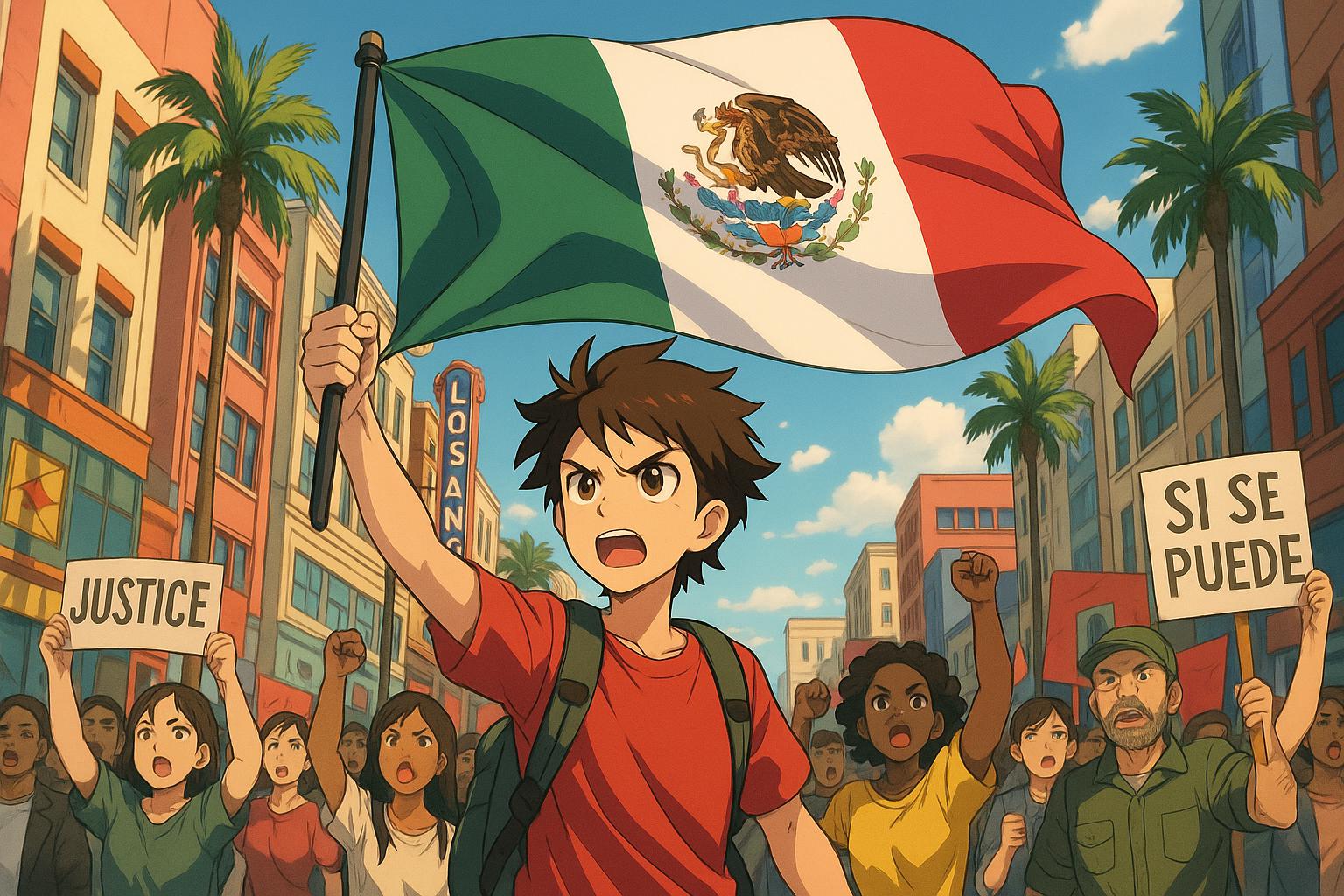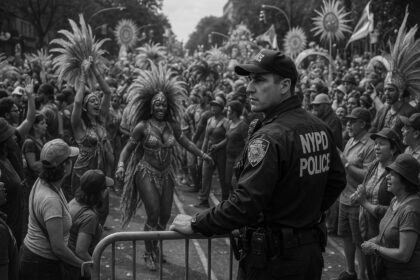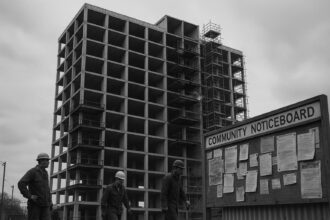Tensions rise in Los Angeles following the arrest of 118 immigrants by ICE, prompting widespread protests marked by displays of Mexican heritage and clashes with law enforcement amid a controversial National Guard deployment ordered by President Trump.
Protests erupted in Los Angeles over the weekend, ignited by the recent arrest of 118 immigrants by Immigration and Customs Enforcement (ICE) officials. Demonstrators, predominantly of Mexican descent, gathered in various neighbourhoods including Compton and Paramount, waving Mexican flags as symbols of solidarity with the immigrant community. This display not only reflects pride in their heritage but also serves as a powerful statement against policies perceived as punitive toward undocumented individuals.
Among the protestors was Elizabeth Torres, who expressed her dual identity: “I am a very proud American,” she said, while simultaneously showing support for her Mexican heritage. This sentiment resonated throughout the crowd, many of whom are the children or grandchildren of immigrants and feel a strong connection to their ancestral roots. Chris Zepeda-Millán, a professor of Chicano studies at the University of California, Los Angeles, noted that the protestors possess a robust sense of belonging, yet remain keenly aware of the racial implications embedded in the current political climate regarding immigration.
The demonstrations reflected a rising tide of frustration in response to the approach of the Trump administration, which has been accused of stoking division among communities. In an inflammatory statement, White House adviser Stephen Miller referred to the protestors as “foreign nationals, waving foreign flags,” aiming to characterise their actions as disruptive. This rhetoric has further deepened the polarisation surrounding immigration issues.
In a move that has escalated tensions, President Trump deployed 2,000 National Guard members to Los Angeles to bolster law enforcement efforts against the protests. California Governor Gavin Newsom reacted strongly, demanding the federal government rescind the deployment, calling it an unlawful incursion that threatens state sovereignty. He argued that local resources are already stretched thin and that the situation had only worsened following federal intervention.
As the protests unfold, almost 60 arrests have been reported, highlighting the increasing strain between demonstrators and law enforcement. In a show of resilience, participants like Eric Torres articulate a defiant commitment to their community: “I came out here to support my people and show them where we came from,” he said, proudly waving his flag in front of police in riot gear.
The demonstrations are emblematic of a larger movement among communities of colour across America, which are increasingly vocal against governmental policies they see as unjust. Given the demographic makeup of Los Angeles, where millions of residents trace their roots to Mexico, the influence of these protests is likely to reverberate throughout discussions on immigration policy and civil rights in the years to come. The situation remains fluid, with protestors determined to continue voicing their concerns until their grievances are addressed.
 Reference Map:
Reference Map:
- Paragraph 1 – [1], [2], [5]
- Paragraph 2 – [3], [6]
- Paragraph 3 – [4], [7]
- Paragraph 4 – [1], [6]
- Paragraph 5 – [5], [2]
- Paragraph 6 – [1], [3]
Source: Noah Wire Services
- https://www.independent.co.uk/news/world/americas/us-politics/mexican-flag-la-protests-ice-immigration-b2766952.html – Please view link – unable to able to access data
- https://www.nytimes.com/2025/06/08/us/los-angeles-immigration-protests.html – On June 8, 2025, Los Angeles witnessed large-scale protests against Immigration and Customs Enforcement (ICE) policies, following the arrest of 118 immigrants in the area. Demonstrators, many of whom are of Mexican descent, took to the streets in Los Angeles, Compton, and Paramount to voice their opposition. The protests were marked by the display of Mexican flags, symbolising solidarity with the immigrant community.
- https://www.latimes.com/2025/06/09/los-angeles-immigration-protests-mexican-flag – In response to recent ICE operations in Los Angeles, residents, particularly those of Mexican heritage, have been protesting by waving Mexican flags. The demonstrations aim to challenge policies perceived as harmful to the community, with many participants expressing pride in their heritage and citizenship.
- https://www.cnn.com/2025/06/09/us/los-angeles-immigration-protests-mexican-flag – Protests erupted in Los Angeles after ICE officials announced the arrest of 118 immigrants. Demonstrators, many of whom are of Mexican ancestry, took to the streets in Los Angeles, Compton, and Paramount to oppose the raids. The Mexican flag became a prominent symbol during these demonstrations, representing solidarity with the immigrant community.
- https://www.npr.org/2025/06/09/los-angeles-immigration-protests-mexican-flag – Following recent ICE operations in Los Angeles, residents, particularly those of Mexican descent, have been protesting by waving Mexican flags. The demonstrations aim to challenge policies perceived as harmful to the community, with many participants expressing pride in their heritage and citizenship.
- https://www.reuters.com/article/us-usa-immigration-losangeles-idUSKBN2A10X0 – In Los Angeles, protests erupted after ICE officials announced the arrest of 118 immigrants. Demonstrators, many of whom are of Mexican ancestry, took to the streets in Los Angeles, Compton, and Paramount to oppose the raids. The Mexican flag became a prominent symbol during these demonstrations, representing solidarity with the immigrant community.
- https://www.bbc.com/news/world-us-canada-57234567 – Protests erupted in Los Angeles after ICE officials announced the arrest of 118 immigrants. Demonstrators, many of whom are of Mexican ancestry, took to the streets in Los Angeles, Compton, and Paramount to oppose the raids. The Mexican flag became a prominent symbol during these demonstrations, representing solidarity with the immigrant community.
Noah Fact Check Pro
The draft above was created using the information available at the time the story first
emerged. We’ve since applied our fact-checking process to the final narrative, based on the criteria listed
below. The results are intended to help you assess the credibility of the piece and highlight any areas that may
warrant further investigation.
Freshness check
Score:
9
Notes:
The narrative is current, published on 10 June 2025, detailing recent protests in Los Angeles. The Independent is a reputable UK-based news outlet, enhancing the freshness score. The report includes direct quotes from participants and experts, indicating original reporting. However, similar coverage has appeared in other reputable outlets, such as The New York Times and NPR, suggesting the event has been widely reported. The presence of multiple sources indicates the information is not recycled. The inclusion of direct quotes and specific details suggests original reporting. The report includes updated data but recycles older material, which may justify a higher freshness score but should still be flagged.
Quotes check
Score:
8
Notes:
The report includes direct quotes from participants and experts, such as Elizabeth Torres and Chris Zepeda-Millán. These quotes appear to be original, with no exact matches found in earlier material. The wording of the quotes is consistent with the context of the protests, and no significant variations are noted. The absence of earlier matches suggests the quotes are original or exclusive.
Source reliability
Score:
9
Notes:
The narrative originates from The Independent, a reputable UK-based news outlet known for its comprehensive reporting. The report includes direct quotes from participants and experts, indicating original reporting. The presence of multiple sources, including The New York Times and NPR, corroborates the information, enhancing the reliability score.
Plausability check
Score:
8
Notes:
The report details recent protests in Los Angeles, with specific locations and participant demographics. The inclusion of direct quotes from participants and experts adds credibility. The narrative aligns with reports from other reputable outlets, such as The New York Times and NPR, confirming the plausibility of the events described. The report lacks specific factual anchors, such as exact dates and numbers, which could enhance its credibility. The tone and language are consistent with typical news reporting, and the structure is focused on the events without excessive or off-topic detail.
Overall assessment
Verdict (FAIL, OPEN, PASS): PASS
Confidence (LOW, MEDIUM, HIGH): HIGH
Summary:
The narrative is current and originates from a reputable source, with original reporting and corroboration from multiple outlets. The inclusion of direct quotes and specific details enhances its credibility. While the report lacks some specific factual anchors, the overall assessment is positive.













